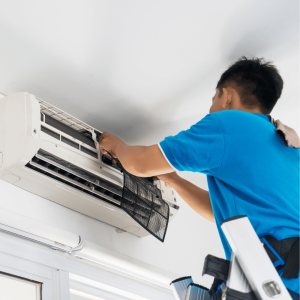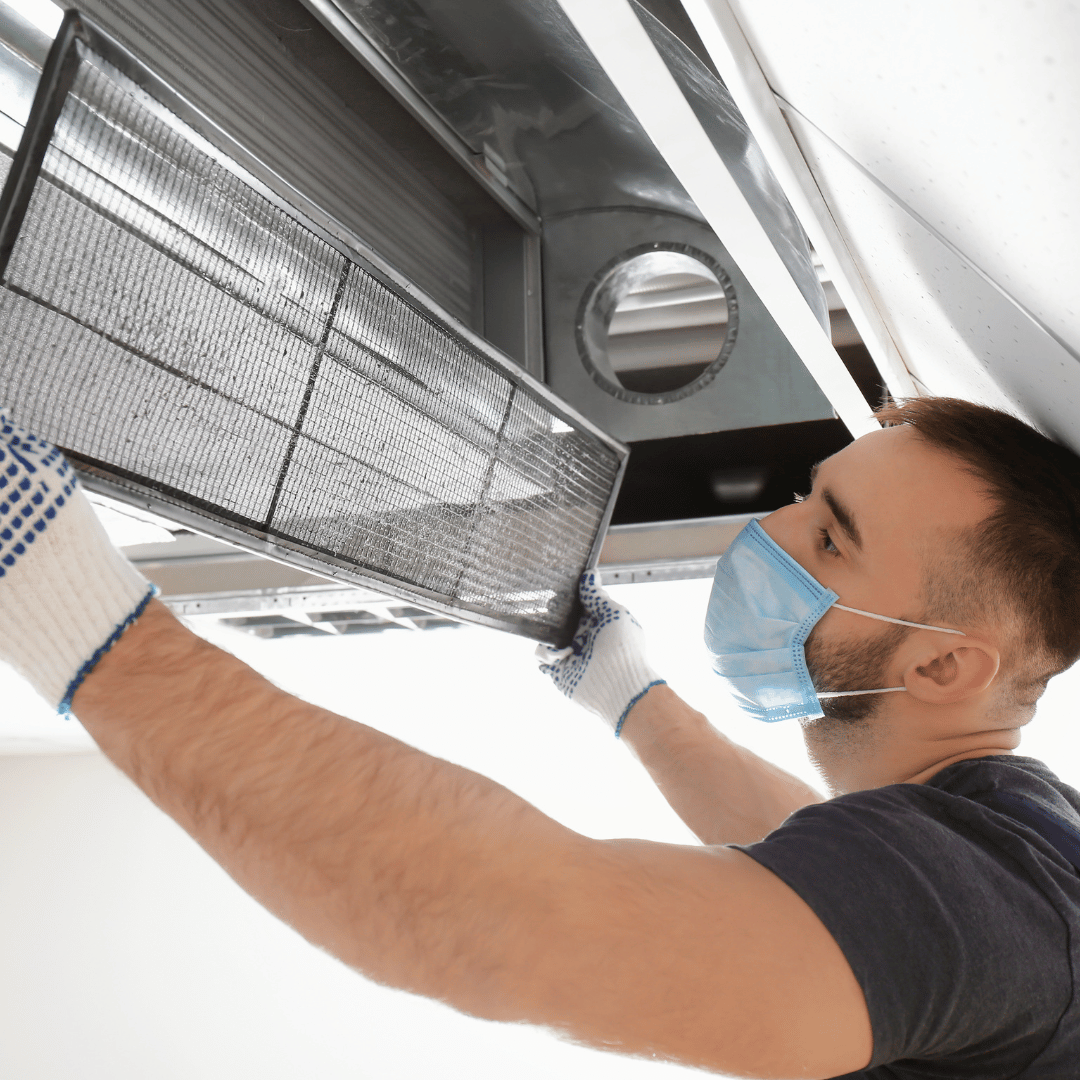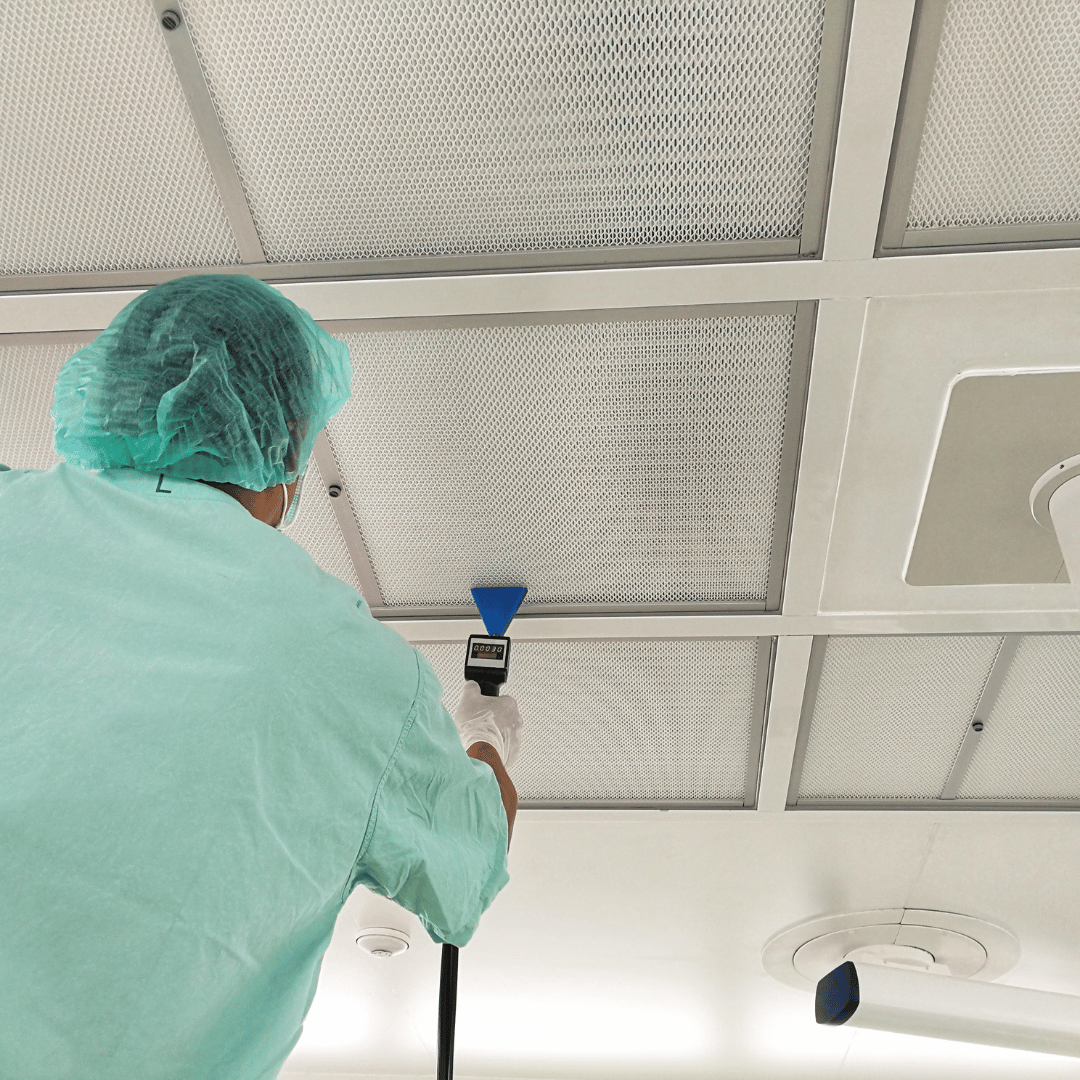
What Does MERV Mean? Understanding Air Filter Ratings
Maintaining clean and healthy indoor air is crucial for a comfortable and safe living environment. One of the key factors in achieving this is choosing the right air filter for your home. The Minimum Efficiency Reporting Value, or MERV, plays a significant role in this decision.
MERV ratings provide a standardized measure of how effectively an air filter can capture airborne particles, from larger dust and pollen to smaller allergens and pollutants. Understanding what MERV means and how it impacts your air filter choices can help you make informed decisions that enhance your home’s air quality and overall comfort.
In this article, we’ll delve into the meaning of MERV, what the rating system stands for, and how different MERV ratings compare. We’ll also explore how MERV-rated filters stack up against other filtration options, such as HEPA filters. Additionally, we’ll highlight the importance of selecting the right MERV rating for your home, linking it to essential interior home maintenance and preventative home maintenance tasks.
What Does the Name MERV Mean?
The term “MERV” stands for Minimum Efficiency Reporting Value. It is a standardized measurement system used to evaluate the performance of air filters. The MERV rating indicates how effectively a filter can capture airborne particles of various sizes, ranging from large dust particles to tiny allergens and pollutants.
Key Points About MERV:
- Purpose: MERV was developed to provide a consistent way to measure and compare the effectiveness of air filters in removing particles from the air.
- Scale: MERV ratings range from 1 to 20, with higher numbers indicating greater filtration efficiency. Each rating corresponds to the filter’s ability to capture particles of specific sizes.
- Application: Understanding MERV helps homeowners choose the right filter for their needs, ensuring improved air quality and better performance of HVAC systems.
Incorporating MERV-rated filters into your interior home maintenance routine can significantly enhance air quality, especially when combined with other preventative measures like dryer vent cleaning and gutter cleaning. Proper air filtration supports the efficiency of your HVAC system and contributes to overall preventative home maintenance.
What Does MERV Stand For?
MERV stands for Minimum Efficiency Reporting Value. This rating system was established to offer a standardized way to assess the effectiveness of air filters. Here’s a closer look at what MERV stands for and how it impacts air filtration:
Full Form of MERV:
- Minimum Efficiency Reporting Value: This term describes the minimum level of efficiency that a filter must achieve to capture airborne particles of different sizes.
How MERV Ratings Work:
- Rating Scale: MERV ratings range from 1 to 20, with each number representing a different level of filtration efficiency. Lower MERV ratings indicate basic filtration, while higher ratings signify more advanced filtration capabilities.
- Particle Size: MERV ratings correspond to the filter’s ability to capture particles of various sizes, from larger particles like dust and pollen to smaller particles like mold spores and pet dander.
- Efficiency Measurement: Filters with higher MERV ratings are more efficient at trapping smaller particles, providing better air quality. For example, a MERV 8 filter is suitable for general household use, while a MERV 13 filter offers superior filtration for finer particles.
Importance of MERV Ratings:
Understanding what MERV stands for helps you choose the appropriate filter for your home’s needs. Whether you’re focusing on exterior home maintenance tasks such as pressure washing or window washing, or addressing indoor concerns like dryer vent cleaning, selecting the right MERV rating ensures that your air filter performs optimally, contributing to overall preventative home maintenance.
What is a Good MERV Rating?
Selecting the right MERV rating is crucial for ensuring effective air filtration in your home. The “best” MERV rating can vary depending on your specific needs and the level of air quality you desire. Here’s a guide to understanding what constitutes a good MERV rating for residential use:
MERV Rating Overview:
- MERV 1-4: These filters offer basic protection and are typically used in inexpensive, non-HVAC applications. They capture large particles such as dust and lint but may not be effective against smaller allergens.
- MERV 4: Generally considered insufficient for most home environments due to its limited filtration capabilities.
- MERV 5-8: These filters provide a moderate level of filtration and are commonly used in residential settings. They are effective at capturing larger allergens like pollen, dust mites, and mold spores.
- MERV 8: Suitable for most homes, offering improved filtration of common household allergens.
- MERV 9-12: These filters provide enhanced filtration, capturing smaller particles and improving indoor air quality. They are ideal for homes with allergy sufferers or those seeking better air quality.
- MERV 11: Effective at filtering out smaller particles, including pet dander and mold spores.
- MERV 13-16: These filters offer high-level filtration, capturing even finer particles such as smoke and some bacteria. They are often used in homes with specific air quality needs or in environments with high levels of airborne contaminants.
- MERV 13: Provides superior air quality, suitable for homes with health concerns or frequent exposure to allergens.
- MERV 17-20: These filters are typically used in specialized applications, such as hospitals or clean rooms. They offer the highest level of filtration but may not be necessary for typical residential use.
- MERV 16: Offers top-tier filtration but might restrict airflow if not compatible with your HVAC system.
Choosing the Right MERV Rating:
A good MERV rating for your home depends on your specific needs:
- For general household use, MERV 8 or MERV 11 filters are usually adequate.
- For homes with allergy sufferers or significant dust and pollen, consider MERV 13.
- Avoid overly high MERV ratings like MERV 16 unless you have specific air quality requirements, as they may affect HVAC efficiency.
Selecting the appropriate MERV rating plays a crucial role in your interior home maintenance strategy. It ensures that your air filters effectively manage indoor air quality, complementing other maintenance tasks such as gutter cleaning and dryer vent cleaning.
Which is Better: MERV 11 or MERV 16?
When choosing between MERV 11 and MERV 16 filters, it’s essential to consider your specific needs and the impact on your HVAC system. Here’s a comparison to help you determine which is better for your home:
MERV 11 Filters:
- Filtration Efficiency: MERV 11 filters are highly effective at capturing particles such as pollen, dust mites, mold spores, and pet dander. They also trap some larger particles like smoke and fine dust.
- Advantages:
- Balanced Performance: Provides excellent air quality without excessively restricting airflow.
- Ideal for Most Homes: Suitable for households with common allergens or for those seeking improved air quality without the need for specialized filtration.
- Energy Efficiency: Less likely to cause strain on your HVAC system compared to higher MERV ratings, which can be crucial for maintaining overall preventative home maintenance.
MERV 16 Filters:
- Filtration Efficiency: MERV 16 filters offer advanced filtration capabilities, capturing very fine particles such as smoke, bacteria, and some viruses. They provide superior protection against smaller airborne contaminants.
- Advantages:
- Enhanced Air Quality: Ideal for homes with specific air quality concerns, such as severe allergies or respiratory conditions.
- High-Level Filtration: Offers the highest level of particle removal, providing cleaner air but may come with certain trade-offs.
- Considerations: Higher MERV ratings can sometimes restrict airflow, potentially leading to increased energy consumption and additional wear on HVAC systems.
Choosing Between MERV 11 and MERV 16:
- Home Needs: If your primary goal is to enhance air quality and reduce common allergens, MERV 11 is often sufficient. It balances effective filtration with minimal impact on HVAC performance.
- Special Requirements: For homes with specific air quality concerns or in environments with high levels of pollutants, MERV 16 provides superior filtration. However, ensure that your HVAC system can handle the increased resistance without compromising efficiency.
Incorporating the right filter into your home’s maintenance routine can significantly impact your interior home maintenance. Consider how MERV 11 or MERV 16 fits into your overall preventative home maintenance strategy, and consult with experts to ensure that your filter choice complements other tasks like gutter cleaning and dryer vent cleaning.
Is MERV or HEPA Better?
When choosing an air filter, you might encounter both MERV-rated filters and HEPA (High-Efficiency Particulate Air) filters. Each type has its strengths and is suited to different needs. Here’s a comparison to help you determine which is better for your situation:
HEPA Filters:
- Definition: HEPA filters are designed to capture at least 99.97% of particles as small as 0.3 microns. They are considered one of the most efficient filters for removing airborne contaminants.
- Advantages:
- Superior Filtration: Provides high-level protection against very fine particles, including allergens, dust mites, pollen, and some bacteria and viruses.
- Health Benefits: Ideal for individuals with severe allergies or respiratory conditions due to their exceptional particle capture capabilities.
- Usage: Commonly used in specialized environments such as hospitals, laboratories, and clean rooms.
MERV-Rated Filters:
- Definition: MERV (Minimum Efficiency Reporting Value) filters are rated on a scale from 1 to 20, indicating their efficiency in capturing particles of various sizes.
- Advantages:
- Range of Options: MERV ratings offer a broad spectrum of filtration levels, from basic to advanced, allowing you to select a filter that matches your specific needs and HVAC system requirements.
- Balance: MERV-rated filters can provide good filtration without the potential strain on HVAC systems that HEPA filters might cause, especially at higher MERV ratings.
Comparison:
- Filtration Efficiency:
- HEPA Filters: Generally superior in terms of capturing the smallest particles, making them an excellent choice for achieving the highest level of air purity.
- MERV Filters: Offer various levels of efficiency, with higher MERV ratings approaching the filtration capabilities of HEPA filters but with a broader range of options for different needs.
- Impact on HVAC Systems:
- HEPA Filters: Can create significant airflow resistance, potentially putting strain on HVAC systems. They may require modifications to the system or special housing.
- MERV Filters: Typically offer better compatibility with standard HVAC systems, with higher MERV ratings available for those needing enhanced filtration without excessive resistance.
- Cost and Maintenance:
- HEPA Filters: Often more expensive and may need to be replaced more frequently due to their high efficiency.
- MERV Filters: More cost-effective and available in various price ranges, making it easier to select a filter that fits both your budget and maintenance needs.
If your primary concern is achieving the highest possible air quality, a HEPA filter might be the better choice. However, if you need a balance between effective filtration and system compatibility, a high MERV-rated filter (like MERV 11 or 13) can offer excellent performance while being more suitable for standard HVAC systems.
Integrating the right air filter into your preventative home maintenance plan ensures that your home’s air quality is optimized. Whether you choose a HEPA filter or a MERV-rated filter, consider how it complements other aspects of interior home maintenance such as dryer vent cleaning and gutter cleaning.
What is the Difference Between MERV and Regular Filters?
Understanding the difference between MERV-rated filters and standard filters can help you make informed decisions about air filtration in your home. Here’s a breakdown of the key distinctions:
MERV-Rated Filters:
- Definition: MERV stands for Minimum Efficiency Reporting Value, a standardized rating system that measures the effectiveness of air filters in capturing airborne particles of various sizes.
- Efficiency: MERV-rated filters are categorized on a scale from 1 to 20, with higher numbers indicating greater filtration efficiency. These filters are designed to capture a broad range of particle sizes, from large dust particles to fine allergens.
- Performance:
- Higher MERV Ratings: Provide superior filtration, capturing smaller particles and improving air quality. Filters with higher MERV ratings (e.g., MERV 13-16) are more effective at trapping microscopic particles and pollutants.
- Application: Suitable for homes with specific air quality needs or those requiring enhanced protection against allergens and pollutants.
Regular Filters:
- Definition: Regular filters, often referred to as standard or basic filters, typically do not have a MERV rating or use a more general classification system.
- Efficiency: These filters usually provide basic filtration, capturing larger particles such as dust, lint, and some pollen but may not be effective against smaller allergens or pollutants.
- Performance:
- Basic Filtration: Regular filters may offer minimal protection and are often used in less demanding applications where high-level filtration is not required.
- Application: Commonly used in environments where basic air quality maintenance is sufficient, or as a cost-effective option for general use.
Key Differences:
- Filtration Capabilities:
- MERV-Rated Filters: Offer a range of filtration levels, from basic to advanced, providing better control over air quality and capturing a wider range of particles.
- Regular Filters: Typically offer limited filtration, focusing on larger particles and providing less comprehensive air quality management.
- Impact on HVAC Systems:
- MERV-Rated Filters: Higher MERV ratings can lead to increased airflow resistance, which may require adjustments to HVAC systems to accommodate the higher filtration efficiency.
- Regular Filters: Generally less restrictive on airflow, making them easier to use with standard HVAC systems.
- Cost and Maintenance:
- MERV-Rated Filters: Often more expensive but provide better performance and longer-lasting air quality benefits.
- Regular Filters: More affordable and easier to replace but may require more frequent changes to maintain air quality.
Choosing between MERV-rated filters and regular filters depends on your specific air quality needs and the performance required from your HVAC system. MERV-rated filters offer a more precise measure of filtration effectiveness and are suitable for improving indoor air quality significantly, while regular filters provide a more basic level of protection.
Integrating the right type of filter into your home’s interior home maintenance routine supports overall preventative home maintenance. Whether you are managing dryer vent cleaning, gutter cleaning, or other aspects of home upkeep, selecting the appropriate filter helps ensure your air quality is well-maintained.
Choosing the right air filter for your home involves understanding the differences between MERV ratings and other types of filters. MERV ratings provide a standardized measure of filtration efficiency, helping you select a filter that matches your air quality needs. Whether you opt for a MERV-rated filter for its range of efficiency levels or consider a HEPA filter for superior particle capture, the key is to balance performance with system compatibility.
For most residential applications, a filter with a MERV rating between 8 and 13 offers an excellent compromise between effective filtration and HVAC system efficiency. For specialized needs, such as homes with severe allergies or significant air quality concerns, higher MERV ratings or HEPA filters might be more appropriate.
Incorporating the right filter into your preventative home maintenance plan enhances the overall effectiveness of your home’s air filtration system. Regularly changing filters, along with maintaining other aspects of your home such as gutter cleaning and dryer vent cleaning, ensures that your indoor air quality remains high and your HVAC system runs efficiently.
Ensure your home’s air quality and HVAC system are in top shape by scheduling an air filter inspection with HomeSmiles today. Our comprehensive interior home maintenance services, including pressure washing and window washing, are designed to keep your home in excellent condition. Contact us now to learn more about our services and how we can help you avoid costly repairs down the line.
- Protecting Your Property: Why the Right Cleaning Method Makes All the Difference
- The #1 Thing That’s Dulling Your Curb Appeal (And How to Fix It)
- How Maintenance Bundles Provide Peace of Mind for Busy Small Business Owners and Facility Managers
- Essential vs. Complete Home Packages: Choosing the Right Preventive Care for Your Property
- How a Simplified Service Model Benefits Both Homeowners and Franchisees Alike


